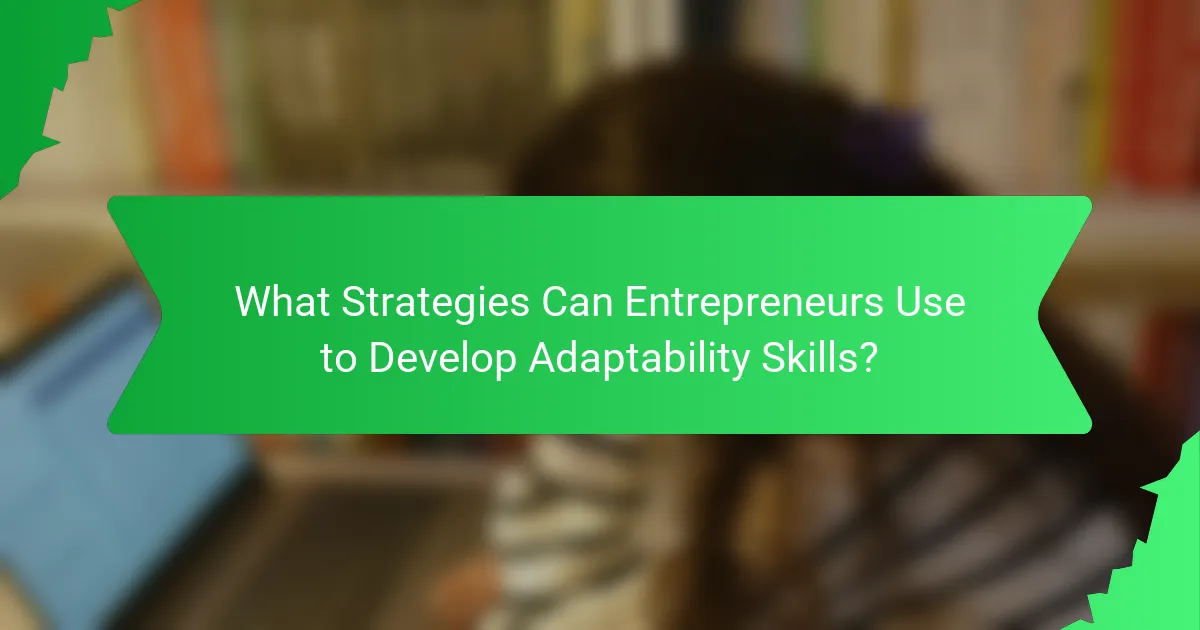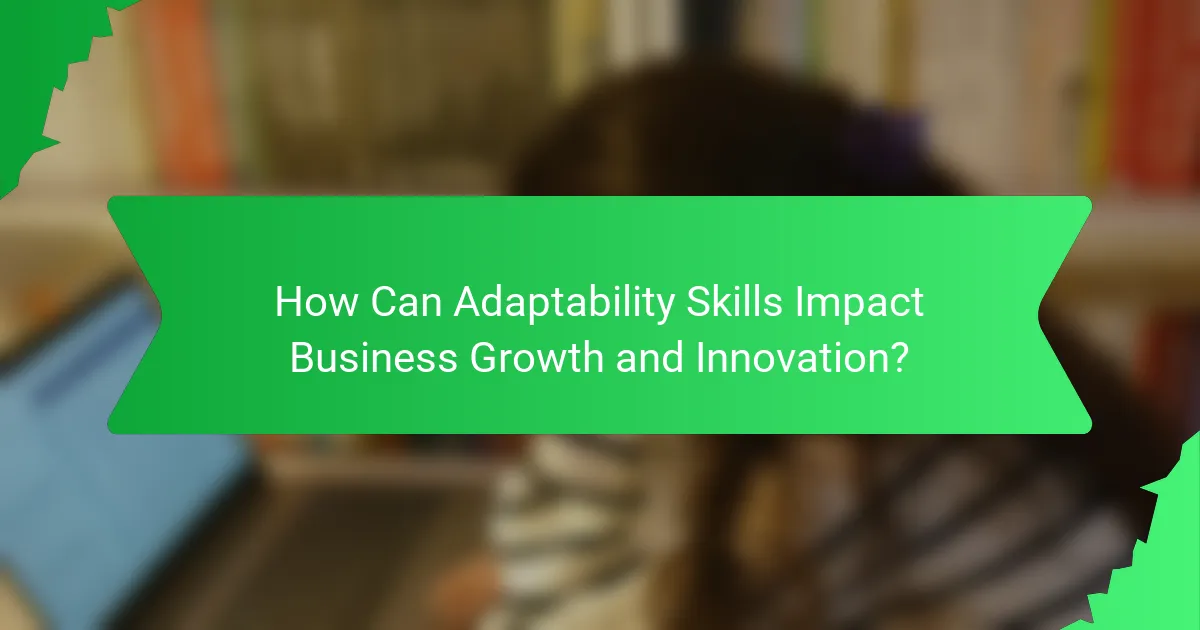Adaptability skills are critical abilities that enable entrepreneurs to adjust to changing conditions and challenges in the business environment. These skills facilitate effective strategy pivots, enhance resilience during setbacks, and improve responsiveness to market trends and customer needs. Research indicates that adaptable leaders significantly outperform their competitors, making adaptability essential for entrepreneurial success. The article outlines strategies for developing adaptability skills, including continuous learning, networking, and maintaining a positive mindset, while also highlighting the impact of these skills on business growth and innovation. Ultimately, adaptability is vital for navigating uncertainties and seizing emerging opportunities in competitive markets.

What are Adaptability Skills and Why are They Important for Entrepreneurs?
Adaptability skills are the abilities that enable individuals to adjust to new conditions and challenges. Entrepreneurs face constant changes in the business environment. These skills allow them to pivot strategies effectively. Adaptability helps entrepreneurs to respond to market trends and customer needs. It also fosters resilience in the face of setbacks. Research indicates that adaptable leaders are more successful in navigating uncertainties. According to a study by the Harvard Business Review, adaptable leaders are 30% more likely to outperform their competitors. Therefore, adaptability skills are crucial for entrepreneurial success.
How do Adaptability Skills Influence Entrepreneurial Success?
Adaptability skills significantly influence entrepreneurial success by enabling entrepreneurs to respond effectively to changing market conditions. These skills allow entrepreneurs to pivot their strategies when faced with unexpected challenges. For instance, a study by the Harvard Business Review found that companies led by adaptable leaders are 30% more likely to achieve long-term growth. Adaptability fosters innovation, as entrepreneurs can explore new ideas and approaches without fear of failure. Furthermore, adaptable entrepreneurs can better manage risks, leading to more informed decision-making. In volatile environments, those with strong adaptability skills can capitalize on emerging opportunities faster than their competitors. This agility directly correlates with increased resilience and sustained business performance.
What specific challenges do entrepreneurs face that require adaptability?
Entrepreneurs face various challenges that require adaptability. Market fluctuations can change demand and affect product viability. Competition often introduces new players, requiring entrepreneurs to innovate continuously. Technological advancements can disrupt existing business models, necessitating quick adjustments. Regulatory changes can impact operations and require compliance adaptations. Customer preferences evolve, demanding flexibility in offerings. Economic downturns can strain resources and require strategic pivots. Supply chain disruptions can affect product availability, necessitating alternative sourcing strategies. These challenges underscore the need for entrepreneurs to remain agile and responsive in their approach.
How can adaptability skills lead to better decision-making?
Adaptability skills enhance decision-making by enabling individuals to respond effectively to changing circumstances. These skills allow entrepreneurs to assess new information quickly. They can pivot strategies based on market trends. Adaptable individuals are more open to feedback and alternative viewpoints. This openness leads to more informed choices. Studies show that adaptable leaders make decisions faster and with greater confidence. For example, a report by McKinsey found that organizations with adaptable leaders outperform their competitors in decision-making speed. Thus, adaptability skills are crucial for effective decision-making in entrepreneurship.
What are the Key Components of Adaptability Skills?
The key components of adaptability skills include flexibility, resilience, open-mindedness, and problem-solving abilities. Flexibility allows individuals to adjust their approaches in changing circumstances. Resilience helps them recover from setbacks and maintain focus on goals. Open-mindedness encourages the acceptance of new ideas and perspectives. Problem-solving abilities enable individuals to navigate challenges effectively. These components collectively enhance an entrepreneur’s ability to thrive in dynamic environments. Research indicates that adaptable entrepreneurs are more likely to succeed in fluctuating markets, as they can pivot strategies when necessary.
What role does emotional intelligence play in adaptability?
Emotional intelligence significantly enhances adaptability. It allows individuals to recognize and manage their emotions and those of others. This awareness facilitates better responses to changing environments. Individuals with high emotional intelligence can navigate stress and uncertainty effectively. Research shows that leaders with emotional intelligence foster resilience in their teams. They create supportive atmospheres that encourage flexibility. Consequently, this leads to improved problem-solving and innovation. Adaptability is thus strengthened through emotional intelligence, enabling entrepreneurs to thrive in dynamic markets.
How does resilience contribute to adaptability in entrepreneurship?
Resilience enhances adaptability in entrepreneurship by enabling entrepreneurs to recover from setbacks. This quality allows them to navigate challenges effectively. Resilient entrepreneurs maintain focus on their goals despite obstacles. They are more likely to embrace change and pivot strategies when necessary. Research shows that resilient individuals can better manage stress and uncertainty. A study by the Harvard Business Review indicates that resilience correlates with improved problem-solving skills. This adaptability is crucial in dynamic business environments. Resilience thus fosters a mindset that is open to innovation and learning.

What Strategies Can Entrepreneurs Use to Develop Adaptability Skills?
Entrepreneurs can develop adaptability skills through continuous learning and embracing change. Engaging in lifelong education helps entrepreneurs stay informed about industry trends. Networking with other entrepreneurs fosters the exchange of ideas and strategies. Practicing resilience through challenges builds the ability to adjust to unforeseen circumstances. Setting flexible goals allows entrepreneurs to pivot when necessary. Seeking feedback from mentors provides insights for improvement and adaptation. Experimenting with new approaches encourages innovative thinking. Lastly, maintaining a positive mindset helps entrepreneurs navigate uncertainties effectively.
How can entrepreneurs practice adaptability in their daily operations?
Entrepreneurs can practice adaptability in their daily operations by regularly assessing market trends. They should gather data on customer feedback to identify changing needs. Implementing agile methodologies can enhance responsiveness to shifts in demand. Entrepreneurs must also foster a culture of innovation within their teams. This encourages creative problem-solving and flexibility in processes. Regularly reviewing and adjusting business strategies is essential for staying relevant. Utilizing technology to streamline operations can also improve adaptability. These practices enable entrepreneurs to navigate uncertainties effectively.
What techniques can help improve flexibility in business strategies?
Adopting agile methodologies can significantly improve flexibility in business strategies. Agile methods emphasize iterative development and responsiveness to change. This approach allows businesses to adapt quickly to market shifts and customer feedback. Implementing regular reviews and adjustments enhances strategic alignment with current conditions. Utilizing data analytics provides insights for informed decision-making. Encouraging a culture of innovation fosters creative problem-solving. Training employees in adaptability skills prepares them for dynamic environments. Collaborating with diverse teams brings varied perspectives, enhancing strategic flexibility. These techniques collectively enable businesses to navigate uncertainties effectively.
How can feedback be utilized to enhance adaptability skills?
Feedback can enhance adaptability skills by providing insights into performance and areas for improvement. It allows individuals to understand their strengths and weaknesses. This understanding fosters a willingness to adjust behaviors and approaches. Regular feedback helps to identify changing circumstances that require new strategies. It encourages a growth mindset, which is essential for adaptability. Research shows that individuals who actively seek and utilize feedback are more likely to succeed in dynamic environments. Studies indicate that feedback can lead to a 20% increase in adaptability in professional settings. Thus, leveraging feedback effectively can significantly improve one’s adaptability skills.
What resources are available for entrepreneurs to learn adaptability skills?
Entrepreneurs can learn adaptability skills through various resources. Online courses from platforms like Coursera and Udemy offer specific training in adaptability. Books such as “Mindset” by Carol S. Dweck provide insights on developing a growth mindset. Workshops and seminars hosted by organizations like SCORE focus on practical adaptability strategies. Networking groups and forums, such as LinkedIn groups, facilitate sharing experiences and advice on adaptability. Additionally, podcasts like “How I Built This” feature stories of entrepreneurs overcoming challenges, showcasing adaptability in action. These resources collectively enhance adaptability skills, critical for entrepreneurial success.
Which courses or workshops focus on developing adaptability?
Courses and workshops that focus on developing adaptability include “Adaptability in the Workplace” offered by LinkedIn Learning. This course teaches strategies to adjust to changing environments. Another option is “Resilience and Adaptability” from Coursera, which emphasizes coping mechanisms in dynamic situations. Additionally, the “Agile Mindset Workshop” by Scrum Alliance fosters flexibility in project management. These programs provide practical skills for entrepreneurs to thrive in uncertain conditions.
How can mentorship support the growth of adaptability skills?
Mentorship can significantly enhance adaptability skills through guidance and support. Mentors provide real-world experiences that challenge mentees to adjust their thinking and actions. They offer feedback that helps individuals identify areas for improvement. Regular interactions with mentors expose mentees to diverse perspectives. This exposure fosters a mindset open to change. Research shows that mentorship increases resilience, a key component of adaptability. According to a study by Allen et al. (2004), mentees report higher confidence in navigating challenges. This confidence is crucial for adapting to new situations. Hence, mentorship plays a vital role in developing adaptability skills essential for entrepreneurial success.

How Can Adaptability Skills Impact Business Growth and Innovation?
Adaptability skills significantly enhance business growth and innovation. These skills enable entrepreneurs to respond effectively to changing market conditions. Companies that embrace adaptability can pivot their strategies when faced with new challenges. This responsiveness fosters innovation by encouraging creative problem-solving. Research shows that organizations with high adaptability are 2.5 times more likely to achieve growth targets. Moreover, adaptable teams can quickly implement new technologies, improving efficiency. In a dynamic environment, adaptability helps businesses seize emerging opportunities. Ultimately, these skills are crucial for long-term success in competitive markets.
What is the relationship between adaptability and innovation in entrepreneurship?
Adaptability and innovation are closely linked in entrepreneurship. Adaptability allows entrepreneurs to respond effectively to changing market conditions. This responsiveness fosters an environment conducive to innovation. When entrepreneurs adapt, they often identify new opportunities and challenges. These insights can lead to innovative solutions and products. A study by the Harvard Business Review found that adaptable companies are 2.5 times more likely to innovate successfully. This demonstrates that adaptability is a key driver of innovation in entrepreneurial ventures.
How do adaptable entrepreneurs respond to market changes?
Adaptable entrepreneurs respond to market changes by quickly assessing new trends and adjusting their strategies. They conduct market research to identify shifts in consumer preferences. This data informs their product development and marketing approaches. They may pivot their business models to align with emerging demands. Adaptable entrepreneurs also foster a culture of innovation within their teams. This encourages creative solutions to unforeseen challenges. They leverage technology to enhance operational efficiency and customer engagement. Studies show that businesses with high adaptability have a 30% higher survival rate in changing markets.
What are some examples of businesses that thrived due to adaptability?
Netflix and Amazon are prime examples of businesses that thrived due to adaptability. Netflix transitioned from DVD rentals to streaming services in response to changing consumer preferences. This shift allowed Netflix to capture a significant market share. Amazon began as an online bookstore but expanded into various sectors, including cloud computing and grocery delivery. This diversification has made Amazon a leader in multiple industries. Both companies continuously innovate their business models to meet evolving customer needs. Their ability to pivot has been crucial for sustained growth and success.
What are the common pitfalls in developing adaptability skills?
Common pitfalls in developing adaptability skills include resistance to change, lack of self-awareness, and insufficient practice. Resistance to change can hinder growth. Individuals may cling to familiar routines, limiting their ability to adapt. Lack of self-awareness prevents individuals from recognizing their strengths and weaknesses. This can lead to missed opportunities for improvement. Insufficient practice means that adaptability skills are not honed in real-life situations. Without real challenges, skills remain underdeveloped. Additionally, fear of failure can paralyze decision-making. This fear often stops individuals from taking necessary risks. These pitfalls collectively impede the development of effective adaptability skills.
How can entrepreneurs avoid becoming resistant to change?
Entrepreneurs can avoid becoming resistant to change by fostering a growth mindset. A growth mindset encourages adaptability and the acceptance of new ideas. This mindset allows entrepreneurs to view challenges as opportunities for learning. Engaging in continuous education helps entrepreneurs stay informed about industry trends. Networking with other professionals provides diverse perspectives on change. Seeking feedback from team members can also highlight areas for improvement. Embracing technology and innovation keeps businesses competitive. Research shows that companies with adaptable leaders are more successful in dynamic markets.
What are the signs of poor adaptability in a business environment?
Signs of poor adaptability in a business environment include resistance to change. Companies may show inflexibility in processes and policies. Employees often exhibit reluctance to adopt new technologies. Communication breakdowns are common when adapting to new situations. A lack of innovation can indicate difficulty in adjusting to market demands. High employee turnover may occur due to dissatisfaction with rigid practices. Poor customer feedback often results from an inability to meet evolving needs. These signs collectively demonstrate a struggle to navigate changes effectively.
What practical tips can entrepreneurs implement to enhance their adaptability skills?
Entrepreneurs can enhance their adaptability skills by embracing continuous learning. This involves staying updated on industry trends and acquiring new knowledge. Networking with other professionals can also provide valuable insights. Engaging in problem-solving exercises helps develop flexibility in thinking. Additionally, setting realistic goals allows for adjustments based on changing circumstances. Seeking feedback from peers fosters improvement and adaptability. Lastly, practicing mindfulness can enhance emotional resilience in uncertain situations. These strategies collectively strengthen an entrepreneur’s ability to navigate change effectively.
How can setting goals improve adaptability in business practices?
Setting goals enhances adaptability in business practices by providing clear direction and focus. When businesses establish specific objectives, they can identify necessary changes to meet those goals. This process encourages proactive problem-solving and innovation. Research shows that companies with defined goals are more likely to pivot effectively in response to market changes. For instance, a study by Locke and Latham (2002) found that goal-setting leads to higher performance and greater adaptability. By regularly reviewing and adjusting goals, businesses can remain agile and responsive to evolving circumstances.
What daily habits foster a mindset of adaptability among entrepreneurs?
Daily habits that foster a mindset of adaptability among entrepreneurs include continuous learning, setting flexible goals, and practicing mindfulness. Continuous learning involves seeking new knowledge and skills regularly, which helps entrepreneurs stay updated with industry trends. Setting flexible goals allows entrepreneurs to pivot when necessary, adapting their strategies to changing circumstances. Practicing mindfulness enhances self-awareness, enabling entrepreneurs to respond effectively to unexpected challenges. Research shows that entrepreneurs who engage in these habits are more likely to thrive in dynamic environments. For instance, a study published in the Journal of Business Venturing found that adaptability is linked to sustained entrepreneurial success.
The main entity of the article is adaptability skills, which are essential for entrepreneurs to navigate the ever-changing business landscape. The article outlines the importance of these skills in fostering resilience, enhancing decision-making, and driving innovation, while also highlighting specific challenges entrepreneurs face that necessitate adaptability. Key components of adaptability skills, including flexibility, resilience, open-mindedness, and emotional intelligence, are discussed, along with strategies for developing these skills through continuous learning, networking, and seeking feedback. Additionally, the article emphasizes the relationship between adaptability and business growth, providing practical tips for entrepreneurs to enhance their adaptability in daily operations.
